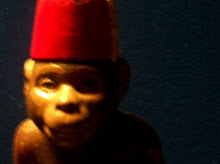Yesterday my daily perusing started with the Chronicle of Higher Ed where I learned of a new book by James P. Carse. I was once quite fond of the two or three of his books I'd read, but I'd kind of forgotten about him. A quick look for the book led me to something called The Long Now, which led me to a very neat little essay by Michael Chabon about the future and how we've kind of abandoned it on a cultural level:
This is the paradox that lies at the heart of our loss of belief or interest in the Future, which has in turn produced a collective cultural failure to imagine that future, any Future, beyond the rim of a couple of centuries. The Future was represented so oftenIt touches on a theme I've mentioned before, our been there done that attitude toward history.
and for so long, in the terms and characteristic styles of so many historical periods from, say, Jules Verne forward, that at some point the idea of the Future—along with the cultural appetite for it—came itself to feel like something historical, outmoded, no longer viable or attainable.
"My son seems to take the end of everything, of all human endeavor and creation, for granted. He sees himself as living on the last page, if not in the last paragraph, of a long, strange and bewildering book. If you had told me, when I was eight, that a little kid of the future would feel that way—and that what’s more, he would see a certain justice in our eventual extinction, would think the world was better off without human beings in it—that would have been even worse than hearing that in 2006 there are no hydroponic megafarms, no human colonies on Mars, no personal jetpacks for everyone. That would truly have broken my heart.
This--the "we're at the end" sentiment--is the Tony Soprano attitude I've talked about before. I understand its pull but I have come to view it with disdain. It's regrettable, maybe even laughable. Somewhere in the midst of all the other perusing I stumbled on this interview with Julian Barbour, a physicist who claims that time isn't real. Obviously I don't understand a good bit of what he's talking about but it reinforced something I've been thinking about quite a bit. We don't know much. Saying so does not discount what knowledge we do possess or its value, it's simply an admission that we're still at the beginning.


